2020-2021 年山西太原高一英语上学期期中试卷及答案
第Ⅰ卷(共 65 分)
第一部分 听力(共两节,满分 15 分)
第一节(共 5 小题;每小题 1 分,满分 5 分)
听下面 5 段对话。每段对话后有一个小题,从题中所给的 A、B、C 三个选项中选出最佳选
项。听完每段对话后,你都有 10 秒钟的时间来回答有关小题和阅读下一小题。每段对话仅
读一遍。答案写在答题卡上。
例:How much is the shirt?
A.£19.15. B.£9.18. C.£9.15.
答案是 C。
1. How does the boy feel on his first day at senior high?
A. Excited. B. Worried. C. Disappointed.
2. Who is the girl under the tree?
A. Betty’s mother. B. Betty’s aunt. C. Betty’s sister.
3. What does the girl get for Christmas?
A. A toy. B. A watch. C. A book.
4. When did the girl get her cat?
A. Two days ago. B. Two months ago. C. Two years ago.
5. Why does the boy feel sad?
A. He finds English hard.
B. He doesn’t like English.
C. He missed the English test.
第二节(共 10 小题;每小题 1 分,满分 10 分)
听下面 3 段对话或独白。每段对话或独白后有几个小题,从题中所给的 A、B、C 三个选项
中选出最佳选项。听每段对话或独白前你将有时间阅读各个小题,每小题 5 秒钟。听完后,
各小题将给出 5 秒钟的作答时间。每段对话或独白读两遍。答案写在答题卡上。
听第 6 段材料,回答第 6 至 8 题。
�
6. Where did the man go?
A. To Qinghai. B. To Guilin. C. To Sichuan.
7. What does the woman think of the pandas?
A. They are lovely. B. They are dirty. C. They are clever.
8. How long did the man stay there?
A. For a week. B. For a month. C. For a year.
听第 7 段材料,回答第 9 至 11 题。
9. How does the girl feel?
A. Painful. B. Cold. C. Sleepy.
10. What will the boy do this afternoon?
A. Buy a new notebook for the girl.
B. Take the girls schoolbag to her.
C. Discuss problems with his teacher.
11. What is the relationship between the two speakers?
A. Classmates. B. Strangers. C. Co-workers.
听第 8 段材料,回答第 12 至 15 题。
12. What is the Huangguoshu National Park famous for?
A. Rivers. B. Valleys. C. Waterfalls.
13. When will the woman go to Lijiang old town?
A. Tomorrow. B. Next week. C. Next month.
14. How does the woman feel about the hotels?
A. Beautiful. B. Expensive. C. Popular.
15. What will the woman do on the last day?
A. Buy some flowers. B. Drink some tea. C. Take some pictures.
第二部分 语言知识运用(共两节,满分 20 分)
第一节 单词填空(共 5 小题;每小题 1 分,满分 5 分)
根据句意内容,从方框中选出正确的单词,完成下列句子。答案的标号写在答题卡上。
A. making
B. actually
C. curious
D. begun
E. impression
�
1. He is quite ________ about the new technology.
2. A patient teacher can always make a deep ________ on her.
3. We are looking forward to ________ progress in the new term.
4. Lucy ________ spends most of her free time reading English stories.
5. What’s your understanding of the saying “Well ________, half done.”?
【答案】1. C
2. E
3. A
4. B
5. D
第二节 完形填空(共 15 小题;每小题 1 分,满分 15 分)
阅读下面短文,从短文后各题所给的 AB、C 和 D 四个选项中选出可以填入空白处的最佳选
项。答案写在答题卡上,
I was about to explain the meaning of the word “gossamer” (小蜘蛛网) to my
five-year-old students. We were learning a poem. I ____6____ because one of them
was waving his hand at me.
“Yes?” I asked.
“Once I got caught in a spider web ____7____ I didn’t see it,” the boy said.
“That’s gossamer!” I shouted, nearly jumping up. “Gossamer things are hard
to see.” Gossamer is also how I might describe the voices of ____8____ young children.
I can only hear them when I am close enough. They are not the children speaking with
ease. They are the children whose faces ____9____ if I call on them, or whisper (低
语) “I don’t know” even when they do ____10____. I don’t want them to ____11____.
I want them to be comfortable being ____12____.
Shy children usually have less practice in speaking, especially when there are
other more children ____13____ to talk. It’s a loud world. Though shy children may
appear ____14____ to be in the background, they are losing opportunities to
participate. Without practice, fear of speaking ____15____.
It takes about three weeks, a small bit of ____16____ each day, for each of my
17 students to learn a poem. So far, they have memorized more than five. And now,
an obvious ____17____ has happened. The “shyest” children are as eager to read
�
aloud as the ____18____ ones.
Practice is an excellent way to increase ____19____ of shy children while
learning a poem. And it is practice that makes them enjoy the ____20____ of the
language.
6. A. stopped
B. breathed
C. argued
reflected
7. A. or
although
B. until
C. because
8. A. curious
B. shy
C. intelligent
anxious
9. A. round
B. blue
C. red
strange
D.
D.
D.
D.
10. A. play
B. ask
C. walk
D. know
11. A. get up
B. take up
C. turn up
D. give up
12. A. focused
B. respected
C. heard
D. told
13. A. eager
B. slow
C. careful
worried
14. A. embarrassed
B. puzzled
C. amazed
satisfied
D.
D.
15. A. hides
B. grows
C. disappears
D. falls
16. A. research
B. practice
C. benefit
D.
discussion
17. A. accident
B. change
C. debate
D. event
18. A. healthy
B. familiar
C. outgoing
impressive
19. A. excitement
B. pressure
C. resource
D.
D.
confidence
20. A. beauty
B. method `
C. trouble
D. speed
【答案】6. A
7. C
8. B
9. C
10. D
11. D
12. C
13. A
14. D
15. B
16. B
17. B
18. C
19. D
20. A
�
第三部分 阅读理解(共两节,满分 30 分)
第一节(共 10 小题;每小题 2 分,满分 20 分)
阅读下面短文,从每题所给的 A、B、C 和 D 四个选项中,选出最佳选项。答案写在答题卡
上。
注意:C 篇分 A、B 两种题型,A(易)题型为客观题,B(难)题型为主观题。
A
Schuylerville High School students have a broad range of interests, which are
reflected by the number of clubs and organizations in which our pupils participate.
Here are some of the most popular clubs.
Environmental Club
Open to students in grades 9-12
Advisor: Mrs. Flores
The High School Environmental Club is open to all students interest increasing
environmental awareness throughout the school. Activities include: recycling,
environmental competitions, volunteering with green schools and outdoor events.
This run student club collects and recycles paper products throughout the school
building.
Freshman Class
Open to students in grades 9-10
Advisor: Mr. winslow
The freshmen class participates in several activities throughout the year to
raise money for the class account. The class officers meet once a month to discuss
business that affects the entire class. All members of the freshman class are
encouraged to participate in some type of community service during the year.
Literary magazine
Open to students in grades 10-12
Advisor: Mr. Sgambati
Members of the Literary Magazine collect, edit and often contribute to the body
of student work. Literary Magazine meetings will also give students the opportunity
to share and receive feedback on the creative pieces that they re working on, as
�
well as the chance to learn about writing practices and strategies.
Mock Trial Team
Open to students in grades 11-12
Advisor: Mrs. Lewis
Mock Trial is an after-school activity that helps students develop useful
knowledge about the law. Students play out all the roles and use general rules of
evidence and fact explanations in a school court. They will work with a real lawyer
and an advisor to further understand the court process.
21. At which club can you take part in the community service?
A. Environmental Club.
B. Freshman Class.
C. Literary Magazine.
D. Mock Trial Team.
22. What does Mock Trial Team aim to do?
A. To encourage students to be lawyers.
B. To develop students’ writing
skills.
C. To explain all kinds of facts at school.
D. To help students learn more
about laws.
23. Where is this text most likely from?
A. A news report.
B. A school website.
C. A research paper.
D. A science magazine.
【答案】21. B
22. D
23. B
B
Making friends can be difficult. It seems like there’s no guide for this
important life skill. But a researcher Jeffrey A. Hall in the University of Kansas
has helped explain the process of friendship-building in a new study published in
the Journal of SocialandPersonalRelationships. It’s the first to find out exactly
how long it takes to make a friend. The answer is a long time.
Hall surveyed 112 college students every three weeks during their first nine
weeks at a Midwestern university. He also gave a one-time questionnaire to 355
American adults who had moved to a new city in the past six months. In these surveys,
the newcomers picked a friend or two and reported how much time they spent together.
�
Unsurprisingly, the more time two people spent together, the closer their
relationship is. Through his analysis, Hall was able to tell how many hours it took
for different levels of friendship to take place:
● It takes students 43 hours and adults 94 hours to turn acquaintances (熟
人) into casual friends.
● Students need 57 hours to change from casual friends to friends. Adults need,
on average, 164 hours.
● For students, friends became good or best friends after about 119 hours.
Adults need an additional 100 hours to make that happen.
“Everyone wants to have friends, but you can’t have friends without making
them,” says Hall. “Making friends takes time.”
That’s why it s easier to make friends in school and at university. Hall thinks
that the close college life develops fast connections and it’s harder for students
to get impacted by other people outside, especially if they go to a university away
from home. For adults, even 50 hours is a lot of hours to spend with someone when
they’re working full time and spending at least an hour a day on the subway.
24. What’s the purpose of the study by Jeffrey A. Hall?
A. To provide a guide for making friends.
B. To describe the benefits of making friends.
C. To explore the time needed for making friends.
D. To study the differences between students and adults.
25. According to Hall, how long do new students need to become best friends?
A. 100 hours.
B. 119 hours.
C. 219 hours.
D. 319
hour.
26. Which of the following has a positive effect on friendship-building?
A. The close college life.
B. Long working time.
C. The impact from others.
D. Time spent on the subway.
【答案】24. C
25. C
26. A
C
When I went off to college in the fall of 1991, I was an 18-year-old man whose
�
favorite letters were the ones on the sports sweater. Four years later, I was crazy
about the letters of the poet Keats, but one author’s penned letters stood out above
the rest. You see, my father wrote me one letter per week from the time I left home.
In an age before email, these letters seemed too ordinary. But they arrived.
Each week. One after another. Again and again. In snowstorms. On holidays. From
foreign countries. They detailed what Dad referred to as “the week that was”—
a day-by-day description of my father’s life.
In 1995, I graduated from college, like many 22-year olds, with plenty of
uncertainty. Some of my questions were pretty typical: What was I going to do? Where
was I going to live? When was I going to apply for graduate school? But one question
was more vital than any other thing. What would happen to the weekly letters? Would
they continue? To my surprise, the letters kept coming, more heartfelt and emotional
than before and always on time. I mean the guy never missed.
As much as I enjoyed my father’s weekly letters, I didn’t fully appreciate
them all those years when they arrived like clockwork. And I never fully understood
why my dad would always ask if I’d received the letter when we spoke.
But now, as I pen my first official letters to my own sons Jackson and Cassius,
it all seems clear. Although our boys have yet to leave for college, I have to accept
that day will soon come. Just the idea of their leaving from our home makes me ache
with sadness only a parent can know.
I am writing about “the week that was” with my daily details. With a box of
over 500 of Dad’s letters nearby and his pen in hand, I write a letter, fighting
back the tears I make it to the end and sign it just as he did. All my love, Dad.
27. What were the letters from the author’s father mainly about?
A. Daily details.
B. Keats’ poems.
C. College and family.
D. Weather and holidays.
28. What does the underlined word “vital” in paragraph 3 refer to?
A. Professional.
B. Interesting.
C. Difficult.
D.
Important.
29. What leads the author to fully understand his father’s letters?
�
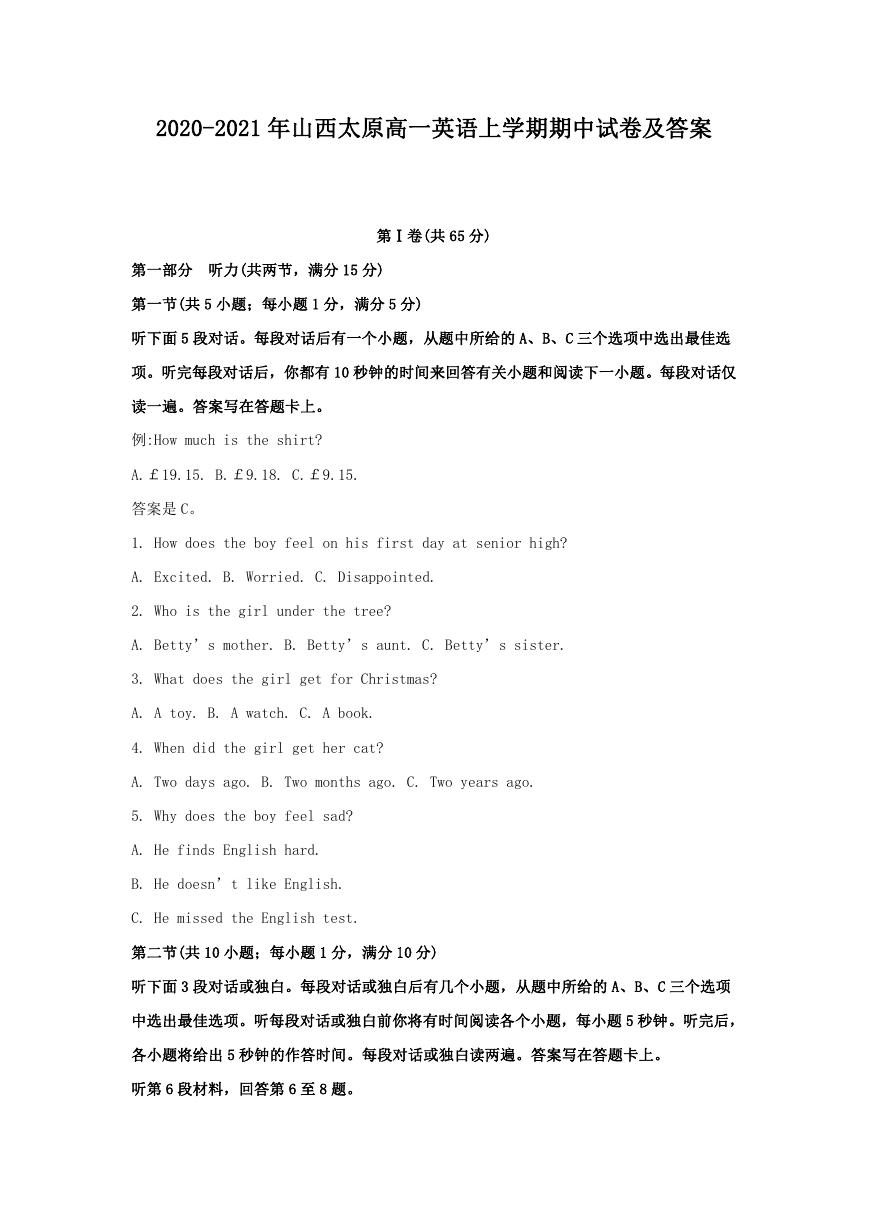
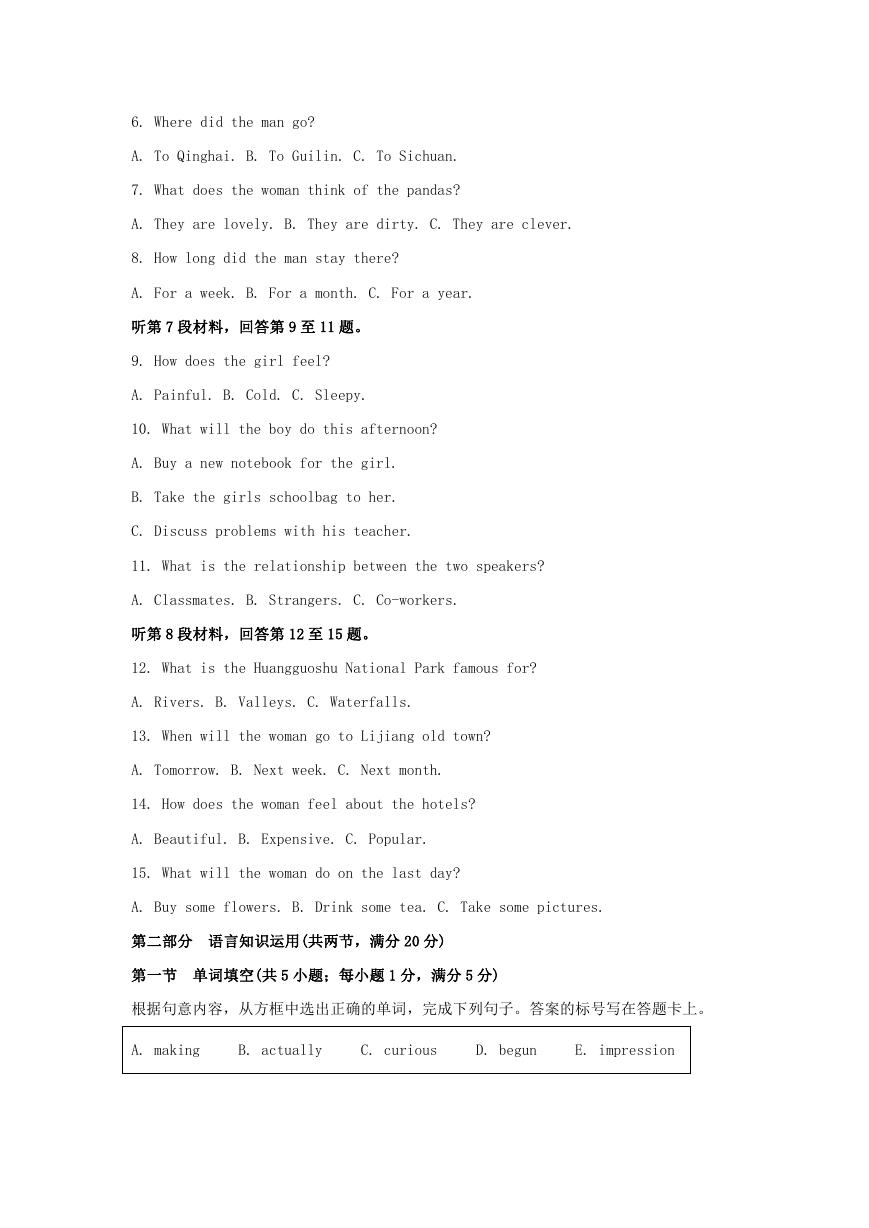
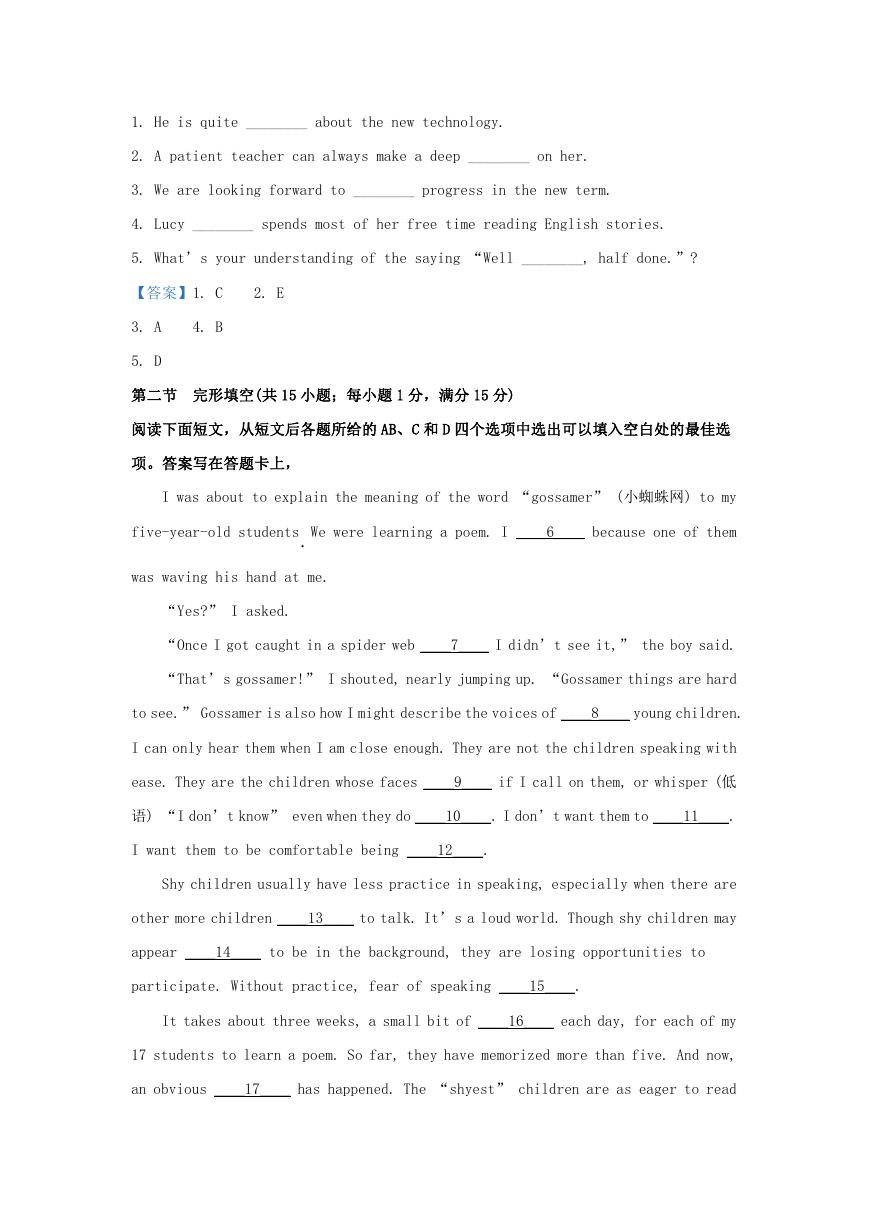
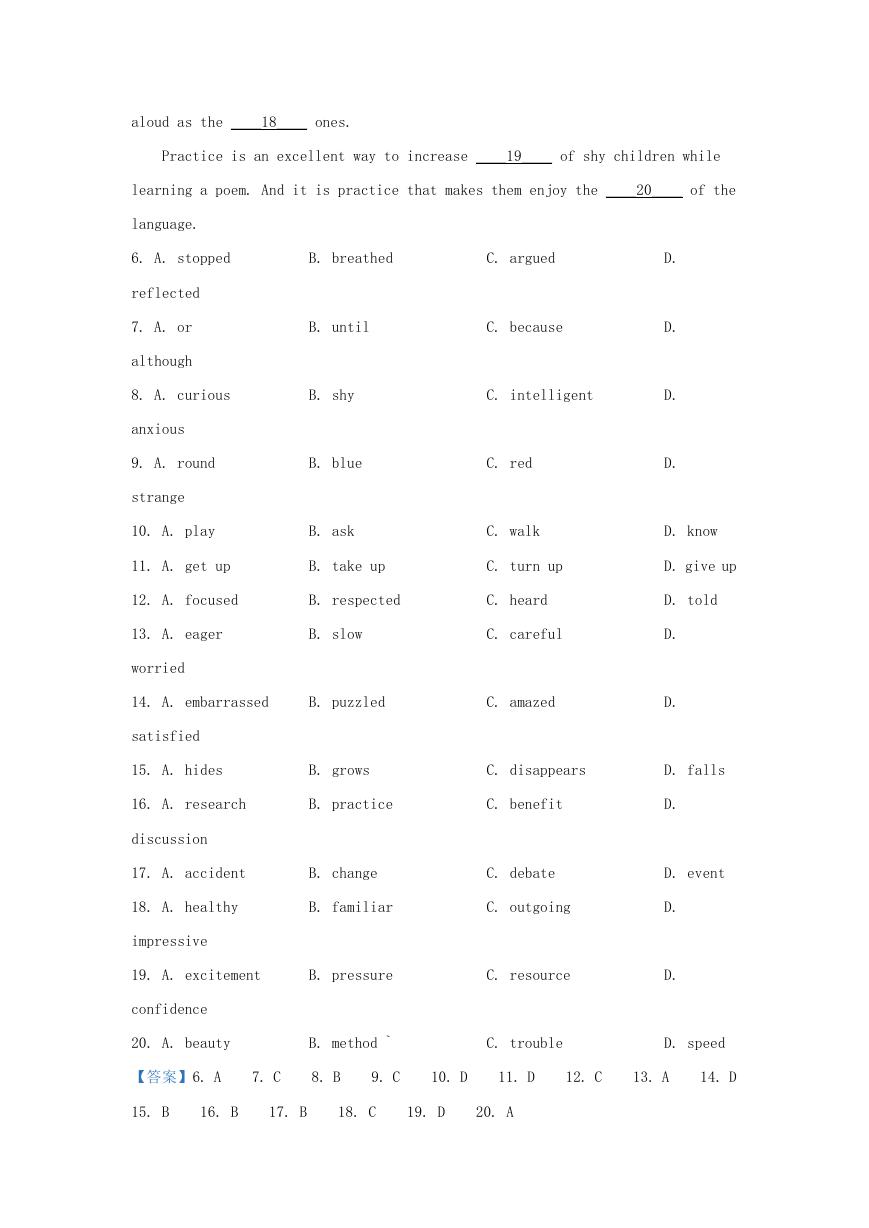
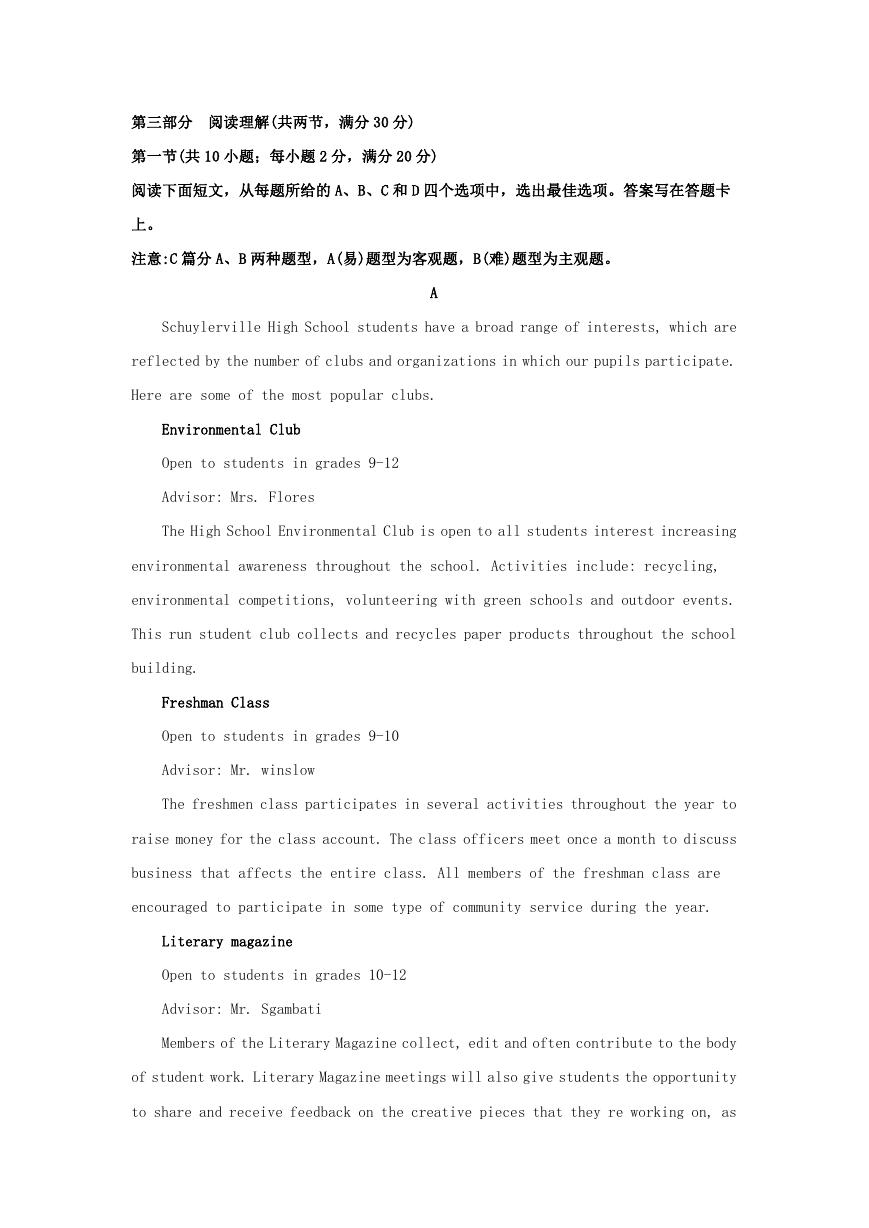

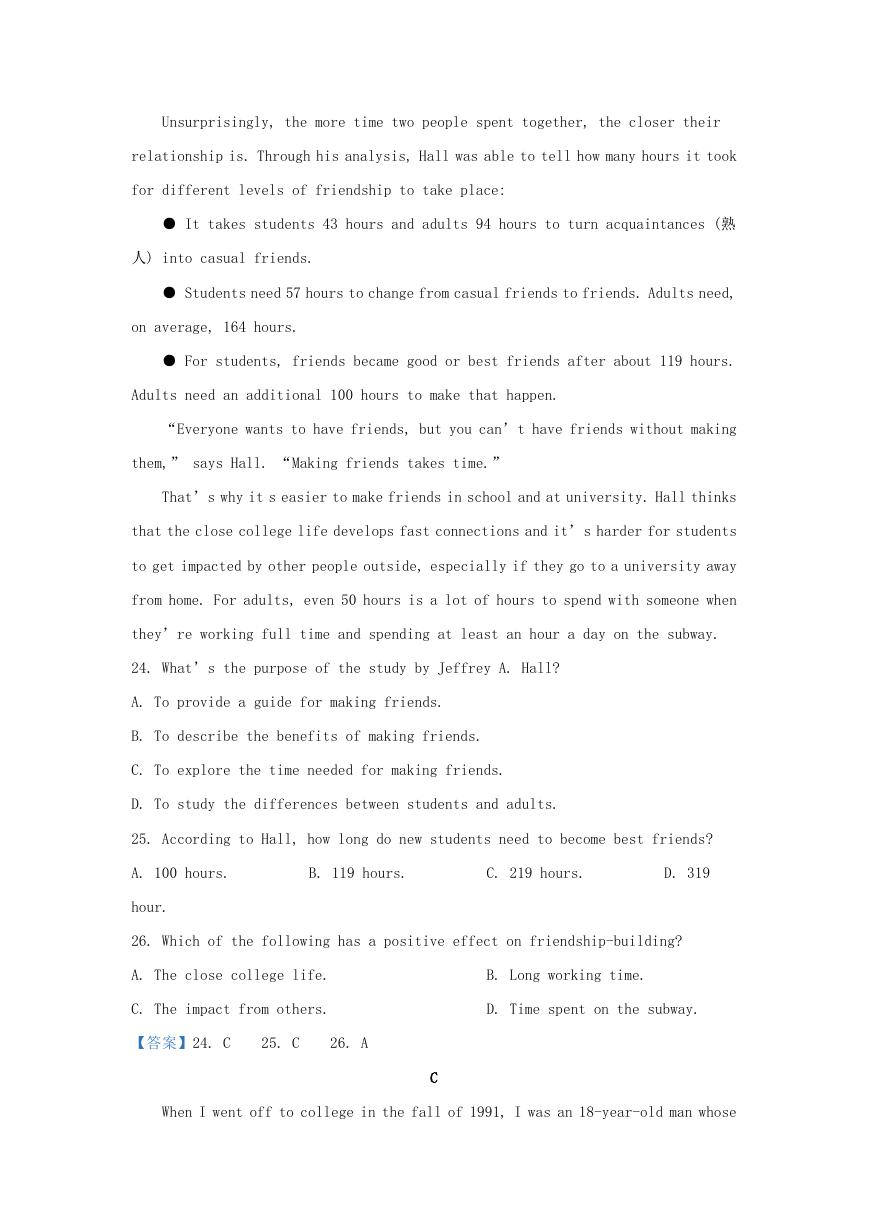
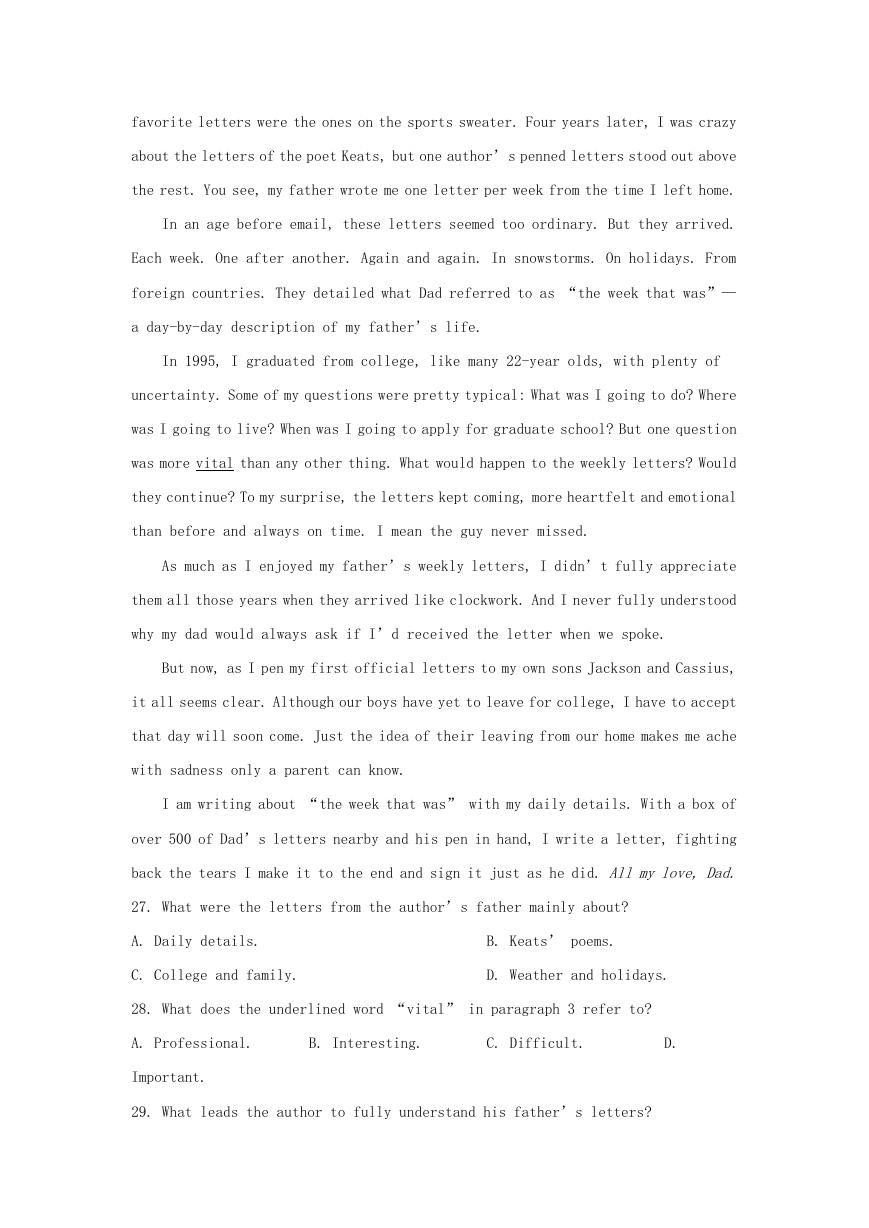








 2023年江西萍乡中考道德与法治真题及答案.doc
2023年江西萍乡中考道德与法治真题及答案.doc 2012年重庆南川中考生物真题及答案.doc
2012年重庆南川中考生物真题及答案.doc 2013年江西师范大学地理学综合及文艺理论基础考研真题.doc
2013年江西师范大学地理学综合及文艺理论基础考研真题.doc 2020年四川甘孜小升初语文真题及答案I卷.doc
2020年四川甘孜小升初语文真题及答案I卷.doc 2020年注册岩土工程师专业基础考试真题及答案.doc
2020年注册岩土工程师专业基础考试真题及答案.doc 2023-2024学年福建省厦门市九年级上学期数学月考试题及答案.doc
2023-2024学年福建省厦门市九年级上学期数学月考试题及答案.doc 2021-2022学年辽宁省沈阳市大东区九年级上学期语文期末试题及答案.doc
2021-2022学年辽宁省沈阳市大东区九年级上学期语文期末试题及答案.doc 2022-2023学年北京东城区初三第一学期物理期末试卷及答案.doc
2022-2023学年北京东城区初三第一学期物理期末试卷及答案.doc 2018上半年江西教师资格初中地理学科知识与教学能力真题及答案.doc
2018上半年江西教师资格初中地理学科知识与教学能力真题及答案.doc 2012年河北国家公务员申论考试真题及答案-省级.doc
2012年河北国家公务员申论考试真题及答案-省级.doc 2020-2021学年江苏省扬州市江都区邵樊片九年级上学期数学第一次质量检测试题及答案.doc
2020-2021学年江苏省扬州市江都区邵樊片九年级上学期数学第一次质量检测试题及答案.doc 2022下半年黑龙江教师资格证中学综合素质真题及答案.doc
2022下半年黑龙江教师资格证中学综合素质真题及答案.doc